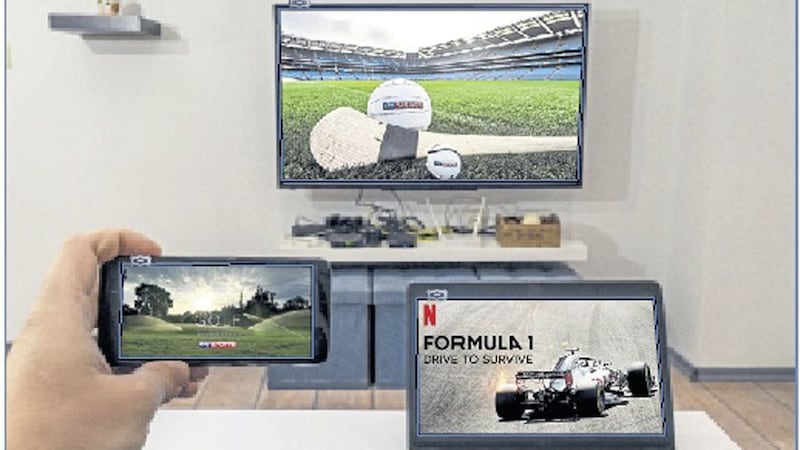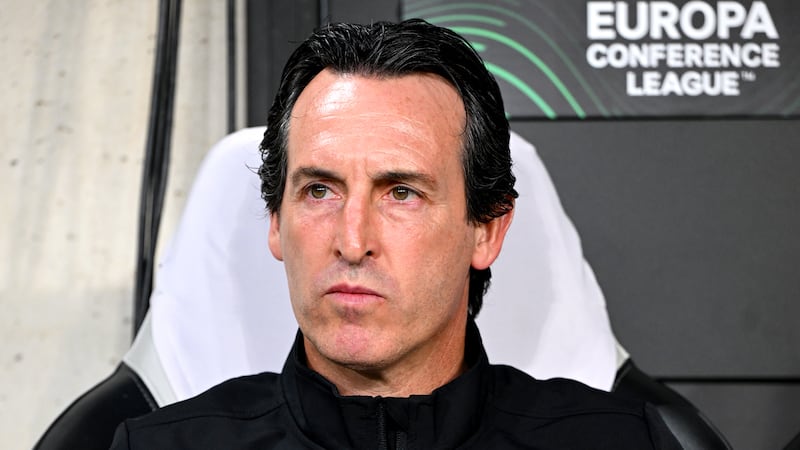OBVIOUSLY, sport plays a large part in my life. The concrete interests are predominantly Gaelic football and soccer. I also have fleeting interests in lots of other sports. It may be basketball, then American Football, then cycling and running.
The recent Netflix documentary, Formula One-Drive to Survive took me back a bit to the ’90s and my childhood.
When I was much younger than I am now, Ayrton Senna and Alain Prost were engaged in one of the most bitter rivalries in racing.
Senna was a hero of mine. He was fearless and totally ruthless.
Senna sported that unmistakable Brazilian racing helmet, and Sunday’s race day coverage was rivalled only by Channel 4’s Italian soccer coverage.
If Saturday was all about work and cleaning up around the small farm we had, Sunday was an action-packed day of sport.
It was early Mass then Saval for underage training or a match.
We would have a match early afternoon between ourselves, with the neighbours making up the numbers.
The game was fiercely competitive and always descended into chaos and the obligatory punch-up – this sequence of events always spelling the end of the game.
However, the separation did not last long. With one television in our house, everyone had to compromise.
It is not as it is now, with iPads, laptops, tablets and phones. These days everyone gets their own screen to watch what they want in isolation.
As a family, with one TV in the house, we shared events and sporting moments and consequently this gave us a lifelong appetite and love for all sports.
Most years the US Masters was an event I watched over the space of three days.
I am not a huge golf fan, however, I appreciate its status in the calendar as one of the major sporting events of the year.
Augusta National is a course as iconic as it is beautiful. Again, you could not but not appreciate watching it in our house, as you had very little choice if you didn’t happen to secure the TV first.
Long before Sky started to dominate sports coverage, you had a varied choice from mainstream channels.
As we now see, the mainstream channels of that time, who were dominating coverage, no longer control sports rights.
BBC, ITV, Channel 4 and RTé do not even bid for sports rights in the same way that they once did,
nor can they even compete with Sky’s domination of sports coverage.
In more recent years, other digital streaming players have come into play and started to threaten Sky TV’s overall position as number one.
This digital war has catapulted sports stars’ earnings to incredible new levels, but unfortunately for us – the consumer – we have literally ended up footing the bill.
Ironically, during the global economic crisis of 2008 onwards, many households would start to scale back on non-essential spending within the weekly and monthly budget, however, the statistics would show that digital subscriptions increased during that time.
Sky and similar payment platforms have grown exponentially and their popularity is such that the TV subscription is now viewed by many consumers as ‘essential’ as items such as milk, bread, rent and rates.
RTE, and to a lesser extent the BBC and TG4, have been the main delivery vehicle to watch our national games.
You feel that the GAA historically had this understanding with RTE in particular, and while it was based on a commercial contract no doubt, the familiarity was evident and RTE has maintained its status as the ‘go-to’ broadcaster to date.
You cannot help but feel that the winds of change are upon us, though.
IT was interesting to hear comments from within the GAA recently that platforms such as Amazon may bid for the rights to televise and stream games at inter-county level.
Despite the fact that Sky’s viewing figures still lag well behind RTé’s coverage on a head-to-head contest, a new generation of consumer tends to be less loyal than those who went before.
My father, for example, wouldn’t dream of picking Sky coverage over RTé on a head to head, however, he will watch a match on whatever device he needs just to see it.
If other streaming channels such as Amazon start to enter the market, the GAA will obviously seek to increase their commercial revenues. One would assume that the GAA would gain a significant financial windfall should that be the case.
With the GAA’s finances taking a hit last year (and it would appear this year too), this may only accelerate moves to sell the rights to the game to streaming giants such as Amazon.
Fergal McGill and his colleagues within Croke Park are intelligent men and, in my experience, there is always a strategic reason for putting such issues into the public realm.
Noting new entrants into the market who may seek to capitalise on the GAA’s popularity may have been a calculated decision.
However, most people now would accept that paying for a service is part of a new normal.
Whether this is via Netflix, Apple or Amazon, the move away from licence-paying channels such as RTé and BBC is an inevitability.
Within most counties nowadays, a streaming service will exist for the club championship and certainly, in Down, it is a very popular and brilliantly delivered service.
And there is certainly no issue in people’s appetite for subscribing to it.
The day of the licence-paying household huddled around one TV enjoying and sharing a moment in time, a sporting contest, a national event, is becoming consigned to the past.
The arguments, conversation and craic within a living room was every bit as enjoyable as the sporting events themselves.
You may have two devices going at the one time now. You could be working on the laptop, watching the game and playing a PlayStation all at the same time.
I can be as guilty as anyone. Modern day distractions are things we should really learn to manage better.
Certainly, the introduction of Sky to GAA coverage and the excellent insights of Peter Canavan, Kieran Donaghy and Jim McGuinness resulted in RTE shaking up their respective teams.
I enjoyed the Joe Brolly, Pat Spillane and Colm O’Rourke dynamic and, dare I say, I think a great deal of others enjoyed the unpredictability of it also.
I still think that RTE will miss that.
However, Tomas ó Sé has more than adequately filled any perceived void and I consider him a brilliant pundit and a key RTE analyst.
How we view our games will continue to change and we will have to adapt and even subscribe in the future.
Inevitably, as the consumers, we will be the one who pay for it through our own pockets.
Those days of sharing sporting moments huddled around one screen has changed within the family dynamic. I enjoyed the ambience of those moments, though, and they will live in the memory.
Increasing the choice for the consumer is advantageous in lots of ways and drives better value for money.
In many ways, the GAA has had to move with the times. As spectators, we are prepared to pay to watch our game and I think this is generally accepted now.
Another entrant, should Amazon decide to bid for the GAA rights, will mean more competition and only time will tell if this is a good thing.







